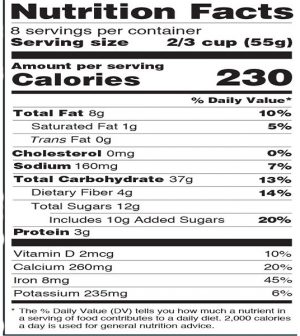- Could Your Grocery Store Meat Be Causing Recurring UTIs?
- Are You Making This Expensive Thermostat Error This Winter?
- Recognizing the Signs of Hypothyroidism
- 10 Strategies to Overcome Insomnia
- Could Artificial Sweeteners Be Aging the Brain Faster?
- Techniques for Soothing Your Nervous System
- Does the Water in Your House Smell Funny? Here’s Why
- Can a Daily Dose of Apple Cider Vinegar Actually Aid Weight Loss?
- 6 Health Beverages That Can Actually Spike Your Blood Sugar
- Treatment Options for Social Anxiety Disorder
Do You Need Vitamin-Enhanced Foods?

Many packaged foods have the potential to give you vitamin overload, especially if you’re already taking a daily multivitamin. Here’s what you need to know.
Manufacturers have been adding nutrients to foods for decades. In fact, it started nearly 100 years ago with the addition of iodine to salt. Vitamins and minerals are added to foods in two key ways.
Foods and beverages can be “enriched.” This means putting back nutrients lost in processing, like the longstanding practice of adding B vitamins to packaged breads and cereals made with refined flours. Keep in mind that this doesn’t necessarily make them as nutrient-dense as foods made with whole grains, because not every natural micronutrient lost in processing can be replaced.
Foods and beverages can be “fortified.” This means adding one or more nutrients not normally found in the food in its natural state. Sometimes this is helpful — adding hard-to-get vitamin D to milk, adding calcium to non-dairy milks and orange juice for those who are lactose intolerant, and adding omega-3 fatty acids to eggs for people who don’t eat enough fatty fish.
But some foods are fortified with levels of nutrients that exceed limits set by the Institute of Medicine. And sometimes they’re just not necessary for you. For instance, according to a University of Toronto study, the most common vitamins added to fortified waters are already abundant in the average diet.
A report from the U.S. Food and Drug Administration warns that vitamin-fortified snack foods are among the most misleading. Researchers found that people are less likely to look past front-of-box claims on snack foods to read the Nutrition Facts label, and they choose fortified snacks over healthier products. When shopping, always remember that adding nutrients to a food that’s full of empty calories doesn’t make it healthy.
More information
Consumer Reports has more on the potential dangers of fortified foods.
Source: HealthDay
Copyright © 2026 HealthDay. All rights reserved.










